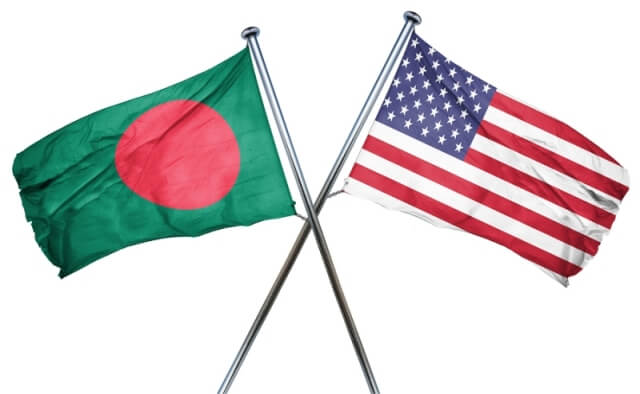Top US state department official for South and Central Asia Alice Wells said yesterday (20 May 2020) that a changing order in global supply chains in view of COVID-19 could benefit Bangladesh’s economy as she appeared on a regional press briefing through virtual media.
“(This) time of diversification of global supply chain . . . can also be a moment of opportunity for Bangladesh,” principal deputy assistant secretary of the US for South and Central Asian Affair Wells told to the media briefing on Wednesday.
She added that the current global COVID-19 pandemic required global businesses to consider “some de-risking from china”.
The US was subtly calling for a changed system for the global supply chains for months ahead of the outbreak of the pandemic in view of its virtual trade war with Beijing.
Wells’s comments came as Washington now visibly backs the campaign suggesting that learning from COVID-19 showed it might be sensible to “de-risk” and diversify supply chains away from China while over the past three decades the country grew as the global economic superpower, reshaping the global economy.
China welcomes foreign companies to participate in its economic growth contrary to previous regimes policy to keep its door firmly shut.
The US official said new economic opportunities might be created for Bangladesh as COVID-19 pandemic is pushing business “de-risking” in China as well as bringing diversification in the global supply chain.
Wells called the press conference as her farewell media briefing when she reviewed the US policies across South and Central Asia during her tenure in the past three years.
She is set to retire in late May after an accomplished diplomatic career.
Asked if the US could really assist Bangladesh to sustain its RMG supply chain responding to a recent call by Dhaka, Wells said her government was trying to take protective medical gears like PPEs to be produced by Bangladeshi garment factories.
“We are trying to match-make between Bangladeshi manufacturers and consumers of America for critical medical supplies as the Bangladeshi factories are retooling and seeking new markets,” she said replying.
Wells acknowledged that the disease created a devastated impact on Bangladeshi RMG units supply lines and said her country would continue to look for all opportunities to increase trade and investment relationship with Dhaka to minimize the country’s economic fallout.
“America remains and has been the largest export market of Bangladesh and we are very important for Bangladesh economic health,” she observed.
The senior US diplomat lauded Dhaka’s role in hosting 1.1 million forcibly displaced Rohingyas from Myanmar saying “Bangladesh is doing much more than just a host nation for Rohingyas”.
She said Dhaka-Washington DC relations saw significant growth in the last three years while Bangladesh achieved impressive economic growth over the last decade in terms of economic strides and human development.
“It (Bangladesh) plays an important role in the Indian Ocean region and our security cooperation grew closer,” Wells said.
She said the US encouraged Bangladesh to renew its commitments to democratic institutions in governing structures that would help further growth in the bilateral relationship between the two countries based on shared values within the Indo-Pacific context.
Wells also responded wide ranges of geopolitical issues related to central and South Asia asked by journalists from various countries of the region including India, Pakistan, Nepal, Afghanistan, Sri Lanka, and Uzbekistan.
